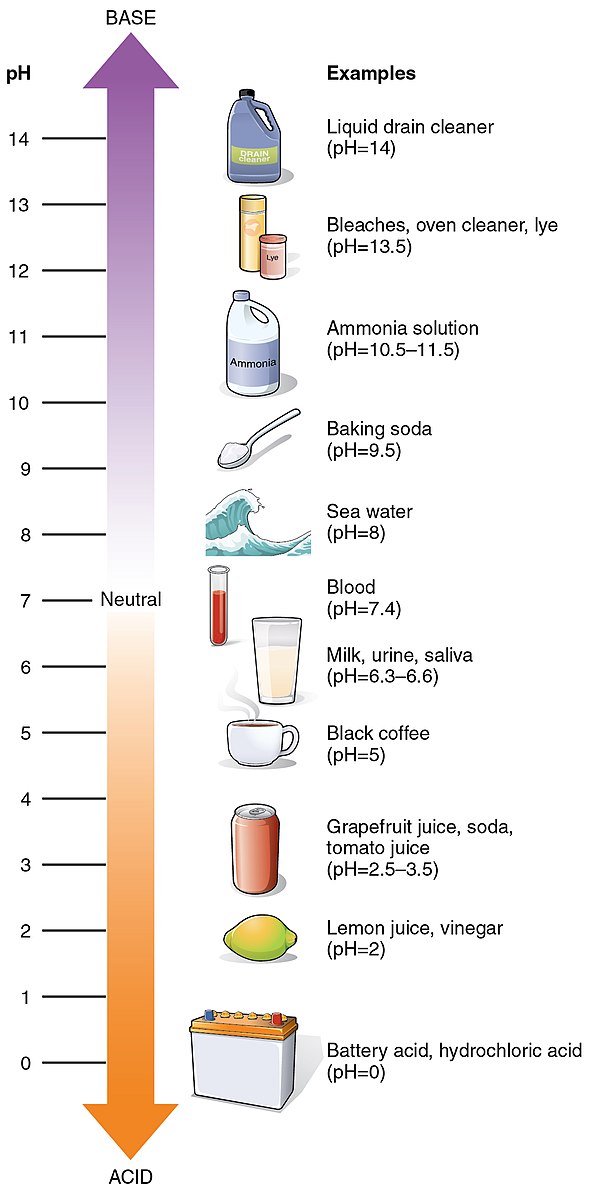The pH of tap water in Philadelphia, USA, is a crucial factor that affects its quality, taste, and safety. Typically, the pH level of Philadelphia’s tap water falls within the range of 6.5 to 8.5, which is considered safe and neutral. However, understanding the nuances of this pH range and the potential contaminants present in the water is essential for ensuring the well-being of Philadelphia residents.
Understanding the pH Scale and Its Significance
The pH scale is a measure of the acidity or basicity of a solution, ranging from 0 to 14. A pH value of 7 is considered neutral, while values below 7 are acidic, and values above 7 are basic or alkaline. The pH of tap water is crucial because it can affect the taste, appearance, and even the functionality of household appliances.
Sources of Philadelphia’s Tap Water
 Image source: OpenStax College
Image source: OpenStax College
Philadelphia’s tap water is sourced from three main sources: the Delaware River, the Schuylkill River, and groundwater wells. The water treatment process involves several steps, including sediment settling, disinfection, coagulation, flocculation, pH adjustment, additional settling, additional disinfection, and filtration. During this process, various chemicals, such as fluoride, zinc phosphate, and ammonia, are added to maintain the water’s quality and safety.
Factors Affecting the pH of Philadelphia’s Tap Water
The pH of Philadelphia’s tap water can be influenced by several factors, including the source of the water, the treatment process, and the presence of natural or man-made contaminants. Acidic water, with a pH below 7, can result from rock formations, the decomposition of plants in lakes or rivers, and acid rain from industrial areas. Conversely, basic or alkaline water, with a pH above 7, can be caused by the addition of chemicals during the treatment process.
Potential Issues with Acidic or Basic Tap Water
Acidic tap water can lead to various issues, such as a metallic or sour taste, stained laundry, blue/green stains in sinks and other fixtures, low water pressure, pipe corrosion, and damage to household appliances like hot water heaters, washing machines, or dishwashers. Basic or alkaline water, on the other hand, can also cause problems, such as a bitter or slippery taste, scale buildup in pipes and appliances, and reduced effectiveness of soaps and detergents.
Contaminants in Philadelphia’s Tap Water
In addition to pH concerns, Philadelphia’s tap water may also contain contaminants, such as bromodichloromethane, chloroform, and total trihalomethanes (THMs). These contaminants are byproducts of the disinfection process and can affect the taste and odor of the water, as well as potentially pose health risks at high levels. However, the levels of these contaminants in Philadelphia’s tap water are generally below the maximum contaminant levels set by the EPA.
Addressing Water Quality Concerns
To address concerns about the pH and contaminants in Philadelphia’s tap water, consumers can use various filtration systems. Simple filters, like Brita or Pur, can improve the taste and remove some contaminants. More advanced filtration systems, such as reverse osmosis or activated carbon filters, can remove a wider range of contaminants but may require professional installation and maintenance.
Conclusion
The pH of tap water in Philadelphia, USA, is generally within the safe and neutral range of 6.5 to 8.5. However, the water can contain contaminants that may affect its taste, odor, and potentially pose health risks at high levels. By understanding the factors that influence the pH and contaminants in Philadelphia’s tap water, residents can make informed decisions about the best water treatment options to ensure the safety and quality of their drinking water.
